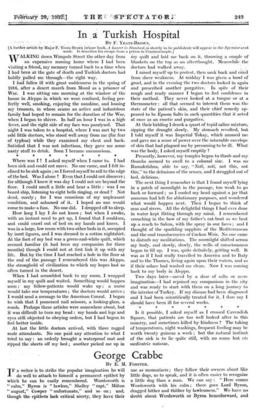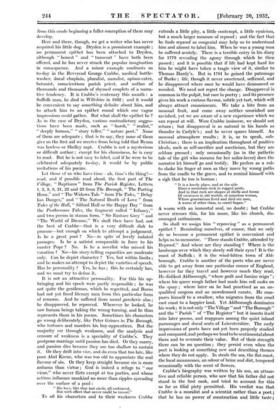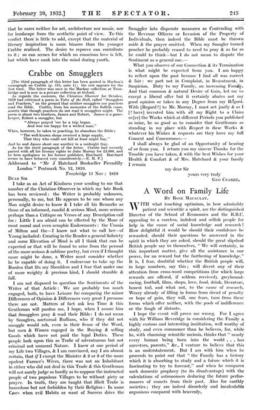George Crabbe
BY E. M.
FonsTER.
IF a writer is to strike the popular imagination he will do well to attach to himself a permanent epithet by which lie can be easily remembered. Wordsworth is " calm," Byron is " lawless," Shelley " rapt," Milton " august," Cowper " unfortunate," • and so - on ; and, though the epithets laek critical. -nicety, they have their use as memothers ; they follow their owners about like little dogs, so to speak, and it is often easier to recognize a little dog than a man. We can say : " Here comes Wordsworth with his calm ; there goes Lord Byron, dragged hither and thither by lawlessness." We have no doubt about Wordsworth or Byron henceforward, and
from this crude beginning a fuller conception of them may develop.
Here and there, though, we get a writer who has never acquired his little dog. Dryden is a prominent example ; no permanent epithet has been attached to Dryden, although " honest " and " turncoat " have both been offered, and he has never struck the popular imagination in consequence. And a minor example confronts us to-day in the Reverend George Crabbe, medical bottle- washer, ducal chaplain, pluralist, moralist, opium-eater, botanist, conscientious parish priest, and author of thousands and thousands of rhymed couplets of a narra- tive tendency. It is Crabbe's centenary this month : a Suffolk man, he died in Wiltshire in 1832 ; and it would be convenient to say something definite about him, and to attach him to an epithet round which our vague impressions could gather. But what shall the epithet be ? As in the case of Dryden, various contradictory sugges- tions have been made, such as " harsh," " realist," " deeply human," " story teller," " nature poet." None of them are adequate ; that is to say, they none of them give us the first aid we receive from being told that Byron was lawless or Shelley rapt. Crabbe is not a mysterious or difficult author ; except for his clumsiness, he is easy to read. But he is not easy to label, and if he were to be celebrated adequately to-day, it would be by public recitations of his poems.
Let those of us who have time—ah, time's the thingl- read, and if possible read aloud, the first part of The Village, " Baptisms" from The Parish Register, Letters 1, 2, 8, 9, 21, 22 and 23 from The Borough, " The Parting Hour," and " The Widows Tale " from The Tales," Delay has Danger," and " The Natural Death of Love " from Talcs of the Hall, " Silford Hall or the Happy Day " from the Posthumous Tales, the fragment called " Infancy," and two poems in stanza form, " Sir Eustace Grey " and "The World of Dreams." We shall then have had, not the best of Crabbe—that is a very difficult dish to procure—but enough on which to attempt a judgement, Is he a great poet ? No—in spite of lovely isolated passages. Is he a satirist comparable in force to his master Pope ? No. Is he a novelist who missed his vocation ? No—his story-telling capacities are moderate only. Can he depict character ? Yes, but within limits ; and he makes no attempt to depict the varieties of speech. Has he personality ? Yes, he has ; this he certainly has, and we must try to define it.
It is not an attractive personality. For this his up- bringing and his epoch were partly responsible ; be was not quite the gentleman, which he regretted, and Burns had not yet freed literary men from this particular form of remorse. And he suffered from moral gaucherie also ; he disapproved, he reproved. Wherever he looked, he saw human beings taking the wrong turning, and he thus represents them in his poems. Sometimes his characters go wrong deliberately, like Peter Grimes in The Borough, who tortures and murders his boy-apprentices. But the majority err through weakness, and the analysis and censure of weakness is a speciality of Crabbe's. They postpone marriage until passion has died. Or they marry, and passion dies because they are too shallow to sustain it. Or they drift into vice, and do even that too late, like poor Abel Keene, who was too old to appreciate the real flavour of sin. Or they keep straight because sin is more arduous than virtue ; God is indeed a refuge to " our vicar," who never flirts except at tea parties, and whose actions influence mankind no more than ripples spreading over the surface of a pool :
" His love, like that last circle, all embraced, But with effect that never could be traced."
. To all his characters and to their weakness Crabbe extends a little pity, a little contempt, a little cynicism, but a much larger measure of reproof ; and the fact that he finds reproof so congenial may help us to understand him and almost to label him. When he was a young man he suffered acutely. There is a terrible entry in his diary for 1779 revealing the agony through which he then passed ; and it is possible that if life had kept hard for him he might have taken a tragic view of it, similar to Thomas Hardy's. But in 1781 he gained the patronage of Burke ; life, though it never sweetened, softened, and he disapproved where once he would have denounced or recoiled. We need not regret the change. Disapproval is common in the pulpit, but rare in poetry ; and its presence gives his work a curious flavour, subtle yet tart; which will always attract connoisseurs. We take a bite from an unusual fruit, and come away neither nourished nor ravished, yet we are aware of a new experience which we can repeat at will. Were Crabbe insincere, we should not return ; but disapproval is as natural in his hands as thunder in Carlyle's ; and he never spares himself. An unusual atmosphere results ; it is, so to speak, sub- Christian ; there is an implication throughout of positive ideals, such as self-sacrifice and asceticism, but they are seldom pressed ; only occasionally (as in the pathetic talc of the girl who mourns for her sailor-lover) does the narrator let himself go and testify. He prefers as a rule to shake his finger at men as they move by wrong paths from the cradle to the grave, and to remind himself with a sigh that he too is human :
" It is a lovely place, and at the side Rises a mountain rock in rugged pride, And in that rock are shapes of shells and forms Of creatures in old worlds, of nameless worms, Whose generations lived and died ere man, A worm of other class, to crawl began."
A worm with an immortal soul, no doubt ; but Crabbe never stresses this, for his muse, like his church, dis- couraged enthusiasm.
So shall we assign him " reproving " as a permanent epithet ? Reminding ourselves, of course, that we only do so because a permanent epithet is convenient and helps us to memorize. "There stands Crabbe, attended by. Reproof." And where are they standing ? Where is the landscape over which they slowly roll their eyes? It is the coast of Suffolk ; it is the wind-bitten town of Ald- borough. Crabbe is another of the poets who are never able to get away from one particular corner of England, however far they travel and however much they read. He disliked Aldborough, "where guilt and famine reign"; where his queer rough father had made him roll casks on the quay ; where later on he had practised as an un- qualified surgeon and an unwelcomed curate. He com- pares himself to a swallow, who migrates from the cruel east coast to a happier land. Yet Aldborough dominates his work; it is not only "The Village " and "The Borough" and the " Parish " of "The Register" but it inserts itself into later poems, and reappears among the quiet inland parsonages and ducal seats of Leicestershire. The early impressions of poets have not yet been properly studied and compared, and perhaps we tend to be sentimental about them and to overrate their value. But of their strength there can be no question ; they persist even when the poet is looking at something new and describing themes where they do not apply. In steals the sea, the flat coast, the local meannesses, an odour of brine and dirt, tempered occasionally with the scent of flowers.
Crabbe's biography was written by his son, an attrac- tive and reliable person, who saw that his father did not stand in the first rank, and tried to account for this so far as filial piety permitted. His verdict was that Crabbe is a moralist and a scientist rather than a poet that he has no power of construction and little taste ;
that he cares neither for art, architecture nor music, nor for landscape from the aesthetic point of view. To this verdict there is little to add, except that the material of literary inspiration is more bizarre than the younger Crabbe realized. The desire to reprove can contribute to it ; so can scenes for which no conscious love is felt, but which have sunk into the mind during youth.








































 Previous page
Previous page